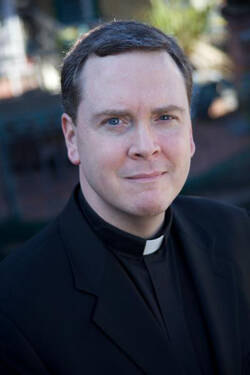I was standing at a food trailer wondering whether the advertised hot dog was really a hot dog or something that the Italian vendor merely thought was a hot dog. Just as I was about to commit, a roar erupted in St. Peter’s Square, a mere 50 feet from where I was standing outside the Vatican press office: “Fumo bianco! Fumo bianco!” I poked my head out from behind the trailer and there it was: white smoke billowing from the chimney on top of the Sistine Chapel. There could be no mistake this time; the smoke was unambiguously white. I started to run, hoping to get out of the square before the growing crowd trapped me; I had promised ABC News that I would talk to them when the time came.
As I crossed the Tiber and headed into the city center, the rain was still falling hard. It was a minor miracle that I was able to get through the mob and back to my room in time for the broadcast. Also miraculous, I was soon to learn, was the fact that a Jesuit now sat on the throne of St. Peter. It occurred to me that the only folks more worked up than the Argentines and the people of Rome were probably the conspiracy theorists who see in Pope Francis the final, definitive proof that the Jesuits control the world. I can assure you that a single visit to a Jesuit community meeting would disabuse any reasonable human being of that idea.
The pick was surprising: Jesuits, most of whom take a special vow of obedience to the pope in matters of mission, have, ironically, had a sometimes rocky relationship with Rome over the centuries. There are a lot of reasons for that, too many to go into. Most recently, in the early 1980s, the Vatican intervened in the internal governance of the Society; it was thought that the Jesuits had grown a little too comfortable with liberal democracy and/or Marxist ideology. That the cardinals would even consider choosing a Jesuit now, I thought, marked a new beginning in that relationship. It is, one prays, a moment of reconciliation.
The cardinals also surprised us by picking a Latin American. It was always possible, of course, but no one here really thought it probable. I don’t think they picked him precisely because he’s a Latin American, but that they picked a Latin American makes sense, given that the church’s center of gravity continues its southerly shift. It is an astonishing historical phenomenon. Just after Columbus’s journey, the Jesuits helped to bring the faith to the new world, following, for good and ill, the Spanish and Portuguese flags. Now, more than four centuries later, the new world has sent a Jesuit back to the capital of the old world to lead its new evangelization.
Lastly, the cardinals surprised us by picking someone who is 76 years old. It was his age, in fact, that left Cardinal Bergoglio near the bottom of the list of papabili. Nearly everyone believed that the new pope would be a younger man, one with the energy to meet the church’s enormous challenges. Still, I can say from my own experience of living with men in their 70s and 80s, that the notion that someone of that age cannot meet the mental and physical demands of hard work is just so much stronzate.
As is the custom, sometime in the next few days the superior general of the Society of Jesus, Adolfo Nicolás, will walk the short distance from the Jesuit headquarters here in Rome past the “hot dog” stand to the Apostolic Palace, where he will meet with the new pope and, in the traditional way, assure him of the Society’s commitment to serve the See of Peter. In a unique way, on that particular occasion, Father General will carry not only the promise of our filial obedience to the new holy father, but our fraternal love for our brother Jesuit and, if you’ll permit me to say so, our pride.








